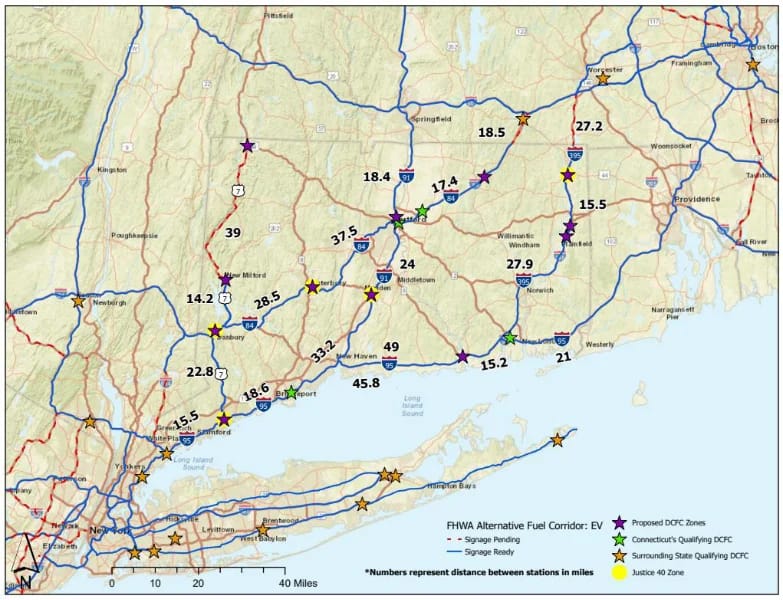The Connecticut Department of Transportation has submitted its Fiscal Year 2024 Plan as part of the state’s efforts to expand public electric vehicle charging infrastructure through National Electric Vehicle Infrastructure Program funds.
Connecticut FY 2024 Approved Plan
Connecticut’s FY 22-23 Plan identifies ten zones throughout the state for consideration as priority areas for Phase 1 build-out of the NEVI program. CTDOT has further mapped these zones as a one-mile drivable buffer from the exit ramp . These sites helped to satisfy many of the federal guidance criteria making them eligible for NEVI funding.
For FY24, Connecticut will continue to prioritize these ten zones in the state’s Fall 2023 NEVI grant solicitation. These sites are anticipated to have at a minimum, four combined charging system (CCS) connectors per location, but as part of the grant solicitation ranking criteria, proposals that have more than the minimum number of connectors will also be considered. Contracted entities will also be required to develop stations that incorporate at minimum, all the specific NEVI guidance and the requirements of the federal rulemaking.
NEVI Phase 1: Alternative Fuel Corridors Proposed DCFC Zones (July 2023)

Ongoing stakeholder engagement has provided valuable viewpoints that aim to guide responsible program development. Council of Governments meeting summaries and an online survey conducted in July shed light on perspectives shared. Connecticut commits to amplifying outreach, particularly with tribes and disadvantaged communities.
Analysis of existing charging access points refers heavily to the EValuateCT dashboard, a collaborative data tool between transportation agencies and analysts. The dashboard offers insights that can aid targeted planning. Stakeholders have also brought potential risks like financial barriers to light while stressing a desire for dependable charging locations protected from weather.
Deployment priorities remain focused on ten zones along designated alternative fuel corridors for Phase 1 buildout. A new proposed zone in Meriden addresses a gap along Interstate 91 uncovered through availability reviews. Protocols for quantifying benefits to disadvantaged communities arising from the program will be detailed in the upcoming grant solicitation.
Transparent collaboration between state partners is evident throughout planning updates. Contracting procedures and evaluation methodologies also aim to promote equitable growth. Through continual engagement and assessment, Connecticut strives to implement a reliable electric vehicle charging network accessible to all drivers statewide.